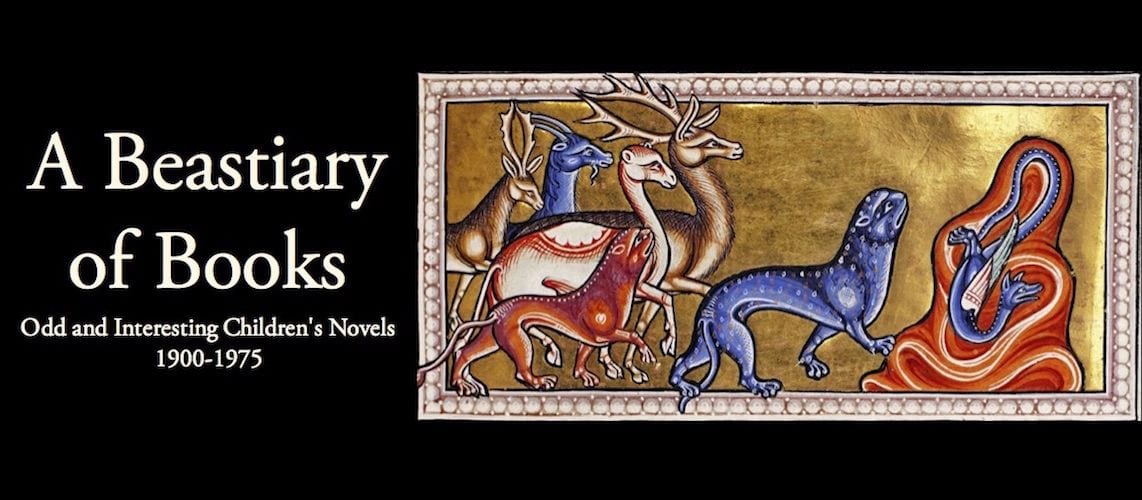 Four siblings from an E. Nesbit book find themselves in The Wolves of Willoughby Chase, wander through a few Enid Blyton Famous Five books and The Secret Garden, to arrive, surprisingly, at a satisfying ending.
Four siblings from an E. Nesbit book find themselves in The Wolves of Willoughby Chase, wander through a few Enid Blyton Famous Five books and The Secret Garden, to arrive, surprisingly, at a satisfying ending.
Edwin, Angeline, Sebastian, and Maud Richleigh are the children of wealthy Londoners around the year 1870. They are fantastically pampered, but live terribly constrained lives, and are only saved from insipidness by possessing wit and personality, and having each other to share interesting ideas and games with. As in Wolves there are parents who go to sea for reasons of health, shifty servants who should never have been left in charge, and the loss of a beloved rocking horse with a classical name.
The children go to the neglected family estate of Tantamount, only to discover it has been left in ruins and used as a smugglers’ headquarters by the dishonest absentee steward. When the last of the few servants abandon them, they befriend two local fisherman’s children (also temporarily without parents) and live a life of romanticized poverty for the summer. The climax of the plot comes through no particular action on the children’s part: there is a rescue of one of their new friends via a rowboat on a stormy sea, after which they see Tantamount on fire in the distance. The disloyal steward has learned that his shenanigans have been discovered and the parents are on their way, so he burns the house to the ground to hide the evidence.
For most people who are not literary scholars it’s not clear why we should care about “theme” in a book, until we see what happens without one. This book can’t make up its mind: though the plot is clear enough, it’s never clear what the book is about. Is it about the children learning self-reliance? Or is it about the eldest, Edwin, growing into his role as heir apparent of the family? Or is it a straight-up adventure story? Or is it about class differences? Or is it about cleansing the family honor of evil and starting anew? It could happily be about all of these things at the same time; the problem is that it is first one thing, then another. It keeps getting bored and dropping threads to pick up new ones.
The ending, though, very nearly makes up for it. The children are swept back to London to a life of clean clothes and proper behavior, but they have been irrevocably changed. They plan to rebuild Tantamount some day when they are grown, but more importantly they carry inside them what happened to them that summer. They will continue to live the life prescribed by their parents while they have to, but the parents no longer dictate, or even really understand, who their children are. It is an unexpectedly profound insight into how it feels to be growing up.

Wow. So did this book precede or copy Wolves of Willoughby Chase? And I don’t believe you have mentioned Joan Aiken in this blog so I am putting in a request for a review of Midnight is a Place.
No, it came after Wolves, and clearly was copying it. Would you believe I’ve never read Midnight is a Place? What would you say about it?
This book about the Richleigh children bears many similarities to Midnight Is A Place as well as The Wolves of Willoughby Chase. This includes an estate in ruins (The Midnight Estate, of the title) which is eventually burned to the ground on purpose. Rather than an evil steward, the estate is mismanaged by Lord Randolf who “won” it by cheating in a card game.
The book has a grim element however and at times feels more like a muckraker style of writing like Oliver Twist or Black Beauty. The children are much less pampered, and after the estate burns, end up fending for themselves in the grim & unromanticized poverty of Blackburn, the fictional town also featured in Wolves of Willoughby Chase.
The story has a slowly building pace that I found compelling both as a child and as an adult. Nothing truly dramatic seems to happen and yet the characters face sudden hardships and solve their problems with a practicality and stubbornness. The ending is both satisfying as various loose ends are tied together to the children’s benefit, and also deeply disappointing as one of the more interesting characters is killed off. This rather pointless death at the last minute felt like a commentary on the futility of social justice movements.
(today’s Anti-spam word: Skew Flat)
Correction: The town is “Blastburn”
Sorry.
Anti-Spam Word: bap Input
It sounds familiar, I think I may have tried to read it and found it too Dickensian. Published after Richleighs, I wonder if there was a back-and-forth influence between the two authors?